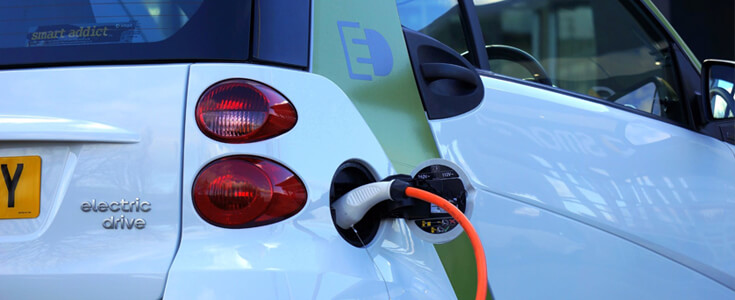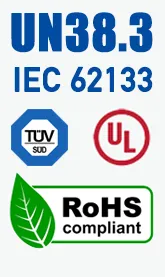
Power Batteries for Electric Cars
The lithium-ion battery is the leader in power batteries for electric cars. The critical difference is the cathode materials which is the most crucial part of the lithium-ion battery. The cathode materials hold more than half of the battery, and the cost is also higher than 40%. The price of the battery is up to the cathode materials. There are lots of different cathode materials for power batteries. LiCoO is used for most lithium-ion batteries, but it's going down because of the higher cost and safe question.
In the power battery field, the three types are LiFePO4, LiMn2O4, and NCM (Ni, Co & Mn). In China, most battery manufacturers use LiFePo4. But the other countries, most battery manufacturers use NCM. The critical point is battery life for electric cars except for safe questions, circuit lives & cost which can improve shortly. NCM power battery can be the preferred.
LiFePO4 Battery
Advantage: Good thermal stability, long circuit life, high safety, no battery memory effect, environment-friendly, supporting rapid charge & discharge. The elements ferrum (Fe) & phosphorus are cheaper except for lithium. So that LiFePO4 battery has an advantage in future sources war.
Disadvantage: Lower energy density 170Wh/kg, lower performance at a lower temperature, lower coherence of battery pack. The energy density of a single LiFePO4 battery can be larger than 150Wh/kg. But it's more economical than 100Wh/kg for the LiFePO4 battery pack.
BYD
BYD is the leader of the LiFePO4 battery in the world. They have the initiative on the technology of the LiFePO4 battery manufacturer for new electric cars. The capacity is 2GWh from BYD Huizhou and 10Gwh from BYD Shenzhen. In these years, BYD also extends the investment NCM battery for the different demand of the weight request.
A123 & Wanxiang Group
A123 was built in 2001, and it's the pioneer of power battery and LiFePO4 battery for electric cars in the USA. They establish a relationship with GM, Fisker, BMW, and other car companies. A123 battery is lighter, smaller and steady, but they still haven't a right solution for reducing the cost of the cell. A123 got US government subsidies $380M for building a battery manufacturer, but it file for bankruptcy in 2012 and Wangxiang group purchased A123 with $250M in 2013. Wanxiang is the largest manufacturer of car accessories from China.
Lishen
Tianjin Lishen produces and sell lithium battery includes round lithium battery, quadrate lithium battery, lithium polymer battery, power battery, photovoltaic cell, and supercapacitor for consumer products, power tools, transportation, and energy storage. They provide lithium battery to Daimler Benz, Geely, Yiqi, Changan, Kia, Beiqi, Jianghuai, Guangqi, Yutong. Their capacity is 2.3Gwh.
CATL
CATL is from the power battery department of ATL. CATL's capacity is 2.43Gwh, and it's a third of the world and second of China for most top electric car companies, such as 1E SUV of BMW. CATL's target is the energy density to 300Wh/kg and half cost.
Lithium Manganate Battery
Advantage: The material manganate is abundant, lower cost and avirulence. Nissan uses the lithium manganate battery for its electric cars because it's safer and higher capacity.
Disadvantage: The manganate is not steady and quickly produce gas during decomposition. Generally, it's used with the other materials together. The high-temperature resistance is terrible so that the life of lithium manganate battery is shorter.
AESC is built with Nissan, Japan Electric & NEC. Their lithium manganate battery is used for Nissan car Leaf.
NCM/NCA Battery
NCM/NCA battery is made of three types. NCM is lithium-manganese-cobalt-oxide. NCA is a combination of 80% nickel, 15% cobalt and 5% aluminum. The leader of the electric car is Tesla. It used lithium cobaltate battery for their first electric car Roadster, but changing to NCM battery for the other electric cars. The energy density is the highest. Mark Newman from Bernstein said in his research report. The anode material of Tesla's NCA battery is silicon carbon so that the energy density is 300Wh/kg.
PANASONIC
PANASONIC is the battery supplier of Tesla. They also built a new factory - Giga factory. Their target is 50Gwh. PANASONIC's 18650 lithium battery has twice the energy density of the LiFePO4 battery, but the risk is also much higher. To deal with the safety problem, PANASONIC and Tesla make the layered battery management system. Every single cell has a fuse at both bottoms. Every layer has a firewall. The fire can be isolated except extending. In 2008, PANASONIC purchased Sanyo include lithium battery, Ni-MH battery, and car navigation system. These batteries have more competitiveness in the world. Tesla used the lithium cobaltate battery 18650 made by Sanyo.
SK Innovation
SK Korea was set up in 1962. They start to make lithium battery from 1996. After that, they also built a production line for making lithium polymer battery for consumer products and power tools. The production base is in Korea, and the capacity is 1Gwh for 40K electric cars each year. SK Innovation already has been the battery supplier for Mitsubishi Fuso & Mercedes-Benz. They also try to cooperate with BESK China. BESK will build the top level of the battery pack production line.
LG Chem
In 2010, the first car Volt used the lithium manganate battery. But they give up the lithium manganate battery made by themselves when it caused some accidents. They are trying to assemble LiFePO4 battery & NCM battery made by LG for their new Volt car in 2016. The new NCM battery is manufactured by new dissepiment technology so that the battery stability is higher and higher.
Boston Power
Boston Power was set up in 2005 Boston US. Their battery technology is from MIT. Boston Power has two manufacturers in China Mainland and Taiwan. They have more than 150 patents and get $589M from US and China governments.
LiPo Battery Safety Precautions
LiPo Battery Performance Standards
How to Store Lithium Polymer Battery Safely
Caution of Lithium Polymer Battery
What's IEC 62133-2:2017 Certification of Lithium-Ion Battery?
What's MSDS of Lithium Polymer Battery?
Quality Control for Lithium Polymer Battery Production
What you should do when you got the lithium polymer battery from us
